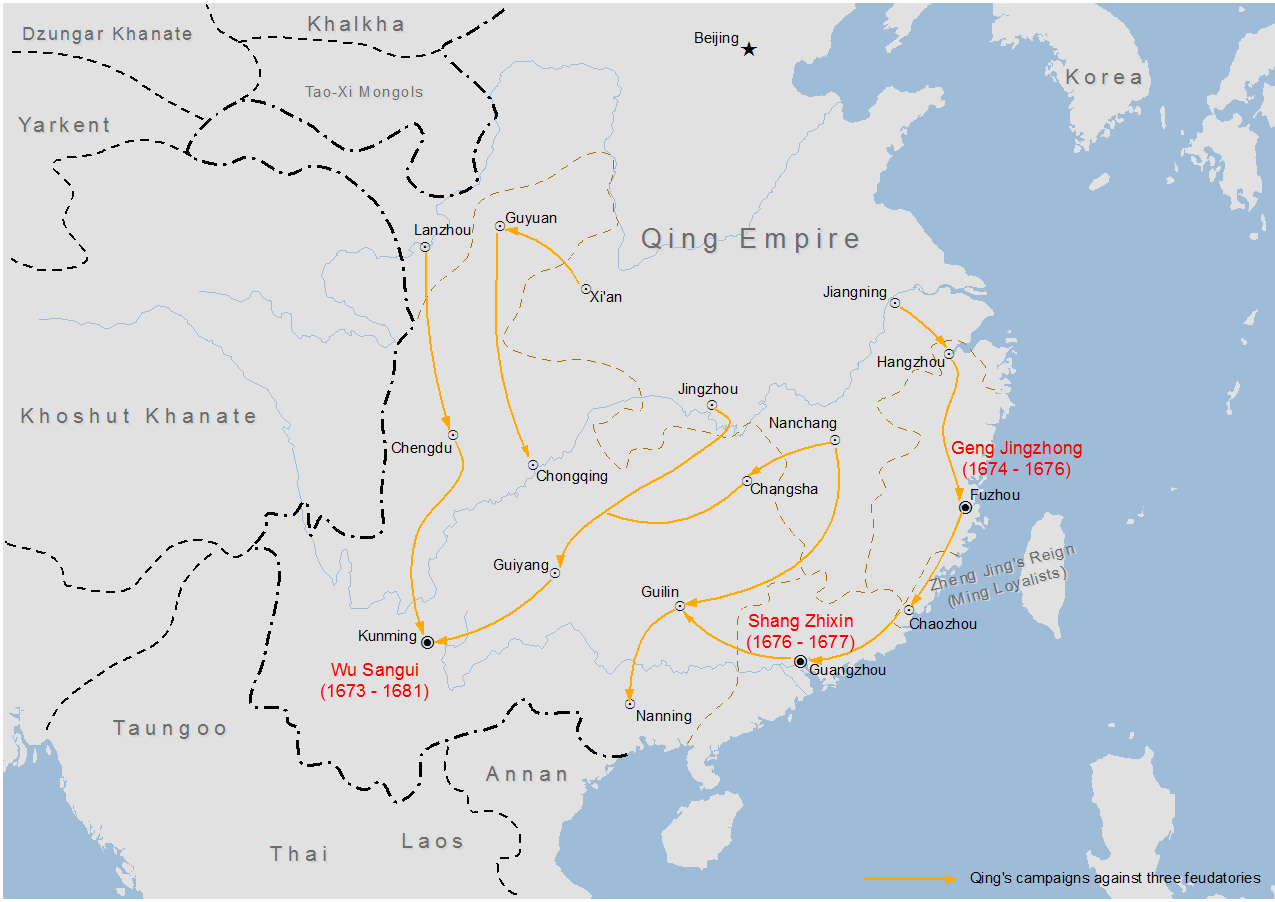Geng Jingzhong on:
[Wikipedia]
[Google]
[Amazon]
Geng Jingzhong (; died 1682) was a powerful military commander of the early  Firmly entrenched as a quasi independent ruler in
Firmly entrenched as a quasi independent ruler in
Qing dynasty
The Qing dynasty ( ), officially the Great Qing,, was a Manchu-led imperial dynasty of China and the last orthodox dynasty in Chinese history. It emerged from the Later Jin dynasty founded by the Jianzhou Jurchens, a Tungusic-spea ...
. He inherited the title of "King/Prince of Jingnan" (éåç) from his father Geng Jimao
Geng Jimao or Keng Chi-mao (; died 1671) was a Chinese prince and military leader, inheriting the title of "Jingnan Prince" (Jingnan wang åçmeaning "Prince who pacifies the South") from his father Geng Zhongming, along with his lands, and ...
, who had inherited it from Jingzhong's grandfather Geng Zhongming
Geng Zhongming (; 1604â1649) was a Chinese military general who lived through the transition from the Ming (1368â1644) to the Qing (1644â1912) dynasty, during which he served both sides. His grandson Geng Jingzhong was one of the Three Fe ...
.
The "Dolo efu" (å碩é¡é§) rank was given to husbands of Qing princesses. Geng Jingmao managed to have both his sons Geng Jingzhong and Geng Zhaozhong (è¿æå¿ ) become court attendants under the Shunzhi Emperor and marry Aisin Gioro women, with Prince Abatai
Abatai (Manchu: ; 27 July 1589 – 10 May 1646) was a Manchu prince and military general of the early Qing dynasty. Although an inconsistent and dissolute malcontent, he nevertheless showed considerable ability as a military leader and a ...
's granddaughter marrying Geng Zhaozhong è¿æå¿ and Hooge's (a son of Hong Taiji) daughter marrying Geng Jingzhong. Geng Juzhong
Geng Juzhong (; 1650 â 1687) was the third son of Geng Jimao and brother of Geng Jingzhong and court member of the Qing dynasty. He was a Third Class Viscount (ä¸çå).
Princess Roujia ( åç¡æåå
¬ä¸»), the daughter of the Manchu Aisin ...
married Princess Heshou Roujia ( åç¡æåå
¬ä¸») of the Manchu Aisin Gioro clan and daughter of Prince Yolo ( å²³æ¨), Prince An
Prince An of the First Rank, or simply Prince An, was the title of a princely peerage used in China during the Manchu-led Qing dynasty (1644â1912). As the Prince A peerage was not awarded "iron-cap" status, this meant that each successive bear ...
.
 Firmly entrenched as a quasi independent ruler in
Firmly entrenched as a quasi independent ruler in Fujian
Fujian (; alternately romanized as Fukien or Hokkien) is a province on the southeastern coast of China. Fujian is bordered by Zhejiang to the north, Jiangxi to the west, Guangdong to the south, and the Taiwan Strait to the east. Its cap ...
, in 1674 Geng Jingzhong rebelled against Qing rule along with the other two of the Three Feudatories Wu Sangui and Shang Zhixin, who were also governing enormous principalities in south China. On November 6, Yanping fell to armies commanded by Jieshu, Qing armies eventually defeated Geng, who surrendered in 1676 and pledged his support to putting down the other revolting feudatories. The Qing then used Geng's troops to fight the other feudatories until the civil war ended. Soon after the Qing final victory in 1681, the Kangxi Emperor had Geng executed by slow slicing
''Lingchi'' (; ), translated variously as the slow process, the lingering death, or slow slicing, and also known as death by a thousand cuts, was a form of torture and execution used in China from roughly 900 CE up until the practice ended aro ...
for treason
Treason is the crime of attacking a state authority to which one owes allegiance. This typically includes acts such as participating in a war against one's native country, attempting to overthrow its government, spying on its military, its diplo ...
.
Geng Jingzhong's brother Geng Juzhong was in Beijing with the Qing court with the Kangxi Emperor during the rebellion and was not punished by the Kangxi Emperor for his brother's revolt. Geng Juzhong died of natural causes in 1687. Geng Juzhong was a Third Class Viscount (ä¸çå).
References
* 1682 deaths Chinese military leaders Qing dynasty generals Year of birth unknown Executed Qing dynasty people People executed by the Qing dynasty Qing dynasty rebels {{China-mil-bio-stub